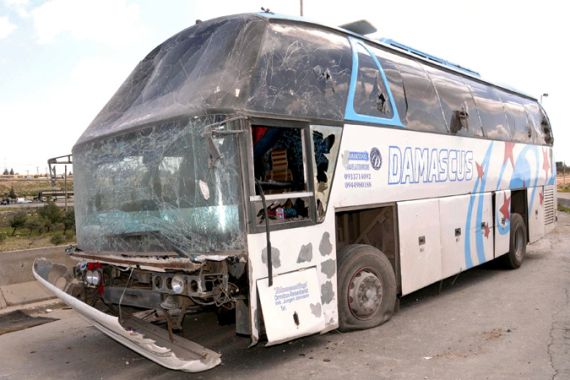Protests in Syria as truce ‘partly observed’
Rallies held as opposition says heavy weaponry remains in populated areas and state television reports a deadly blast.

An internationally brokered ceasefire in Syria is only being “partially observed”, the opposition says, as state television reported that a roadside bomb had killed an army officer.
Heavy weapons and government troops remain deployed in cities, the main opposition bloc said on Thursday, hours after the truce deadline at dawn.
“There is no evidence of a significant withdrawal,” the Syrian National Council’s spokeswoman Bassma Kodmani said.
“The ceasefire is … only partially observed … To us it clear that ceasefire implied withdrawal of all heavy weaponry from cities, populated areas. This has not happened.”
Kodmani also said three people had been killed in the towns of Idlib and Hama since the truce, negotiated by UN and Arab League envoy Kofi Annan, was to go into effect at 6am (03:00GMT).
Meanwhile, the government said “terrorists” were trying to sabotage the UN-backed peace plan.
State media reported that a roadside bomb in Syria’s second city, Aleppo, killed an army officer.
“An armed terrorist group used an explosive device to target a bus transporting officers and non-commissioned officers to their unit in Aleppo. It killed a lieutenant colonel and wounded 24 other people” at 8am (05:00GMT), the official SANA news agency reported.
Colonel Kassem Saadeddine, a spokesman for the opposition Free Syrian Army, denied any involvement in the attack.
“The Free Syrian Army has nothing to do with any attacks. What is reported by SANA is propaganda,” he said.
“This act is a manoeuvre by the regime to avoid fulfilling its commitment and say that the Free Syrian Army violated the truce … Security forces and shabiha [thugs] are behind these acts.”
Protests
Activists reported anti-government protests at universities including in the southern city of Deraa, Aleppo in the north, and the eastern city of Deir el-Zor. A protest march was also held in the northern village of Tamanaa.
Annan said he was “encouraged” that Syria was relatively calm on Thursday.
“I am encouraged by reports that the situation in Syria is relatively quiet and that the cessation of hostilities appears to be holding,” he said.
“Syria is apparently experiencing a rare moment of calm on the ground. This is bringing much-needed relief and hope to the Syrian people who have suffered so much for so long in this brutal conflict. This must now be sustained.”
China, which has stood by Syria during the 13-month crisis, welcomed the truce, saying it hoped the government continued to “take concrete actions to support and co-operate with Annan’s mediation efforts”.
Western leaders have expressed doubts that the Syrian government will honour the deal and have called on other nations to take additional action against Syria at the UN Security Council.
Syria’s official news agency, SANA, reported that the armed forces had called a halt to their mission as of Thursday morning, declaring themselves “successful” in combating “criminal acts by armed terrorist groups”.
But the agency, quoting an unnamed defence ministry source, said the military would remain on alert to confront the “terrorists”.
Since protests inspired by uprisings in other Arab countries first broke out in Syria in March 2011, the government has brutally suppressed the opposition to President Bashar al-Assad, killing more than 9,000 people according to a UN estimate and spawning armed action.
The Annan six-point peace plan requires that both government forces and opposition fighters stop attacks.
Al Jazeera’s Anita McNaught, reporting from Hatay in Turkey, said commanders in the opposition Free Syrian Army had declared their intent to abide by the ceasefire.
Suspicion and cynicism
US President Barack Obama and German Chancellor Angela Merkel agreed in a telephone call on Wednesday that “more resolute” UN Security Council action was needed on Syria, the White House said.
| Anita McNaught reports from Hatay in Turkey on the reported violations of the ceasefire |
“The President and Chancellor shared the concern that the Assad government was not complying with the terms of the agreement negotiated by Kofi Annan and continued to engage in unacceptable brutality against its own people,” a White House statement said.
“They agreed that this underscored the need for the UN Security Council to come together to take more resolute action.”
Al Jazeera’s Cath Turner, reporting from the UN in New York, said the statement by the Syrian government “has been greeted with a great deal of suspicion and cynicism”.
“Susan Rice, the US ambassador to the UN, and the current president of the UN Security Council, spoke about the letter that has been submitted by President Assad, and she was very clear in the fact that she was not taking anything in that letter at its word, because, she said, President Assad did not have a very good track record at keeping his word,” our correspondent said.
